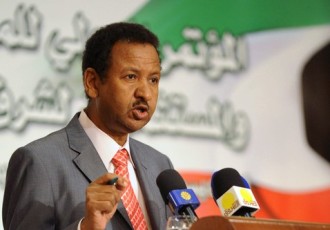Sudan’s ruling NCP to distribute invitations for national dialogue
February 17, 2014 (KHARTOUM) – Sudan’s ruling National Congress Party (NCP) has announced it will extend a written invitation to all political parties to engage in a national dialogue to agree on a mechanism for implementing president Omer Hassan al-Bashir recent initiative.

He stressed that dialogue with political parties would not be restricted by the four points mentioned by Bashir in his recent speech.
Last month, Bashir addressed the nation announcing a 4-point plan for reform “to stop the war and bring peace, free political society, fight against poverty and revitalize national identity”, calling for political forces to engage in dialogue to agree on the implementation items though he did not specify practical steps to do so.
Ismail warned that failure to achieve national consensus among all political parties would prolong the ongoing wars in several states, calling upon opposition parties to accept Bashir’s dialogue initiative without setting preconditions.
He saw the outcome of the dialogue would determine the future of governance, asserting that dialogue must be linked to a specific timetable so as not to lose its validity.
The NCP official further denied his party called for dialogue in order “to buy time”, saying the NCP could run the country alone until the 2015 elections.
“We intend to achieve national consensus in order to eliminate the exorbitant costs of war and revive the economy”, he added
He acknowledged the significant impact of the social media such as Facebook and Twitter on governments, saying regimes are no longer able to control decision making in light of the widespread of social networks.
Ismail pointed to the need for accelerating change process in order to avoid negative consequences which resulted from the Arab spring.
The deputy chairman of the opposition National Umma Party (NUP), Sideeg Ismail, for his part renewed his party’s acceptance for president Bashir’s invitation for dialogue, announcing NUP’s plan to conduct a workshop with the participation of all political parties to arrive at proposals for implementing the initiative.
He said his party’s top agenda for dialogue includes ending the war, forming a transitional government, and offering solutions for the economic crisis and demanded opening a genuine dialogue with the opposition alliance, saying it is the only way for solving Sudan’s problems.
The NUP official called upon the NCP to build trust with the opposition and demanded the latter to send signals reflecting desire to engage in dialogue with the NCP, affirming power must only be accessed through peaceful means.
Meanwhile, the assistant secretary general of the Democratic Unionist Party (DUP) led by Jalal Al-Digair, Ishraqa Said Mahmoud, called for the need to conduct a genuine reform within political parties which accommodates requirements of the Sudanese society.
She pointed to the initiative of the comprehensive popular dialogue launched by the DUP’s late secretary general, Al-Sharif Zain al-Abdeen al-Hindi, saying it complies with the 4points raised by Bashir in his recent address to the nation.
She urged the opposition to remove the government or engage in dialogue with it, adding that shaky opposition wouldn’t solve Sudan’s problems.
The NUP and the opposition Popular Congress Party (PCP) led by the Islamic leader Hassan Al-Turabi are the only opposition parties who so far announced their acceptance to Bashir’s call for national dialogue.
The opposition alliance known as the National Consensus Forces (NCF) refuses NCP call for dialogue and instead propose forming a transitional government and holding a national conference with the participation of rebel groups to discuss a peaceful solution for the conflicts in Darfur region, South Kordofan, and Blue Nile states.
The interim government, in accordance with the opposition platform, would organize general elections once a political agreement on constitutional matters is reached, inaugurating a new democratic regime. But the NCP rejects this proposal saying opposition parties must simply prepare for the 2015 elections and that rebels should sign first peace accords.
(ST)
